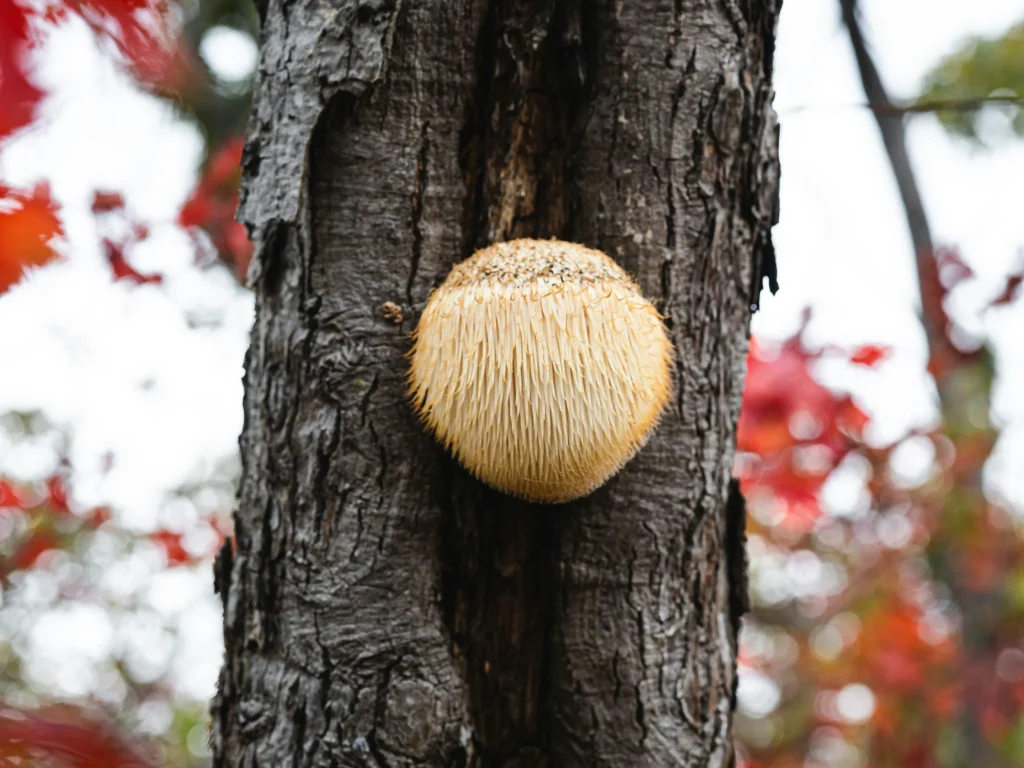Lion’s mane mushrooms are a unique and flavorful edible fungus that offer numerous health benefits. These mushrooms, native to Ohio, are becoming increasingly popular among health-conscious individuals and culinary enthusiasts. In this article, we’ll explore the best spots to find lion’s mane mushrooms in Ohio, their potential health benefits, and how to incorporate them into your diet.
What are Lion’s Mane Mushrooms?
Lion’s mane mushrooms, scientifically known as Hericium erinaceus, are white, globe-shaped fungi that resemble a lion’s mane or a pom-pom. They have long, icicle-like spines that dangle from the fruiting body. These mushrooms are not only visually striking but also offer a delicate, seafood-like flavor often compared to crab or lobster.

Where to Find Lion’s Mane Mushrooms in Ohio
Ohio is home to several prime locations for mushroom hunting, especially when it comes to finding lion’s mane mushrooms. Here are some of the best spots to explore:
- Hocking Hills State Park: This park, located in southeastern Ohio, is known for its stunning landscapes and diverse flora, including lion’s mane mushrooms. Look for them growing on dead or dying hardwood trees, particularly oak, beech, and maple.
- Cuyahoga Valley National Park: Situated near Cleveland and Akron, this park offers ample opportunities for mushroom hunting. Lion’s mane mushrooms can be found here from late summer to early winter, often growing on wounded or decaying trees.
- Wayne National Forest: As Ohio’s only national forest, Wayne National Forest spans over 240,000 acres and is a prime location for finding lion’s mane mushrooms. Focus your search on areas with abundant dead or dying hardwood trees.
- Mohican State Park: Located in central Ohio, Mohican State Park is another excellent spot for mushroom hunting. Lion’s mane mushrooms can be found here growing on oak, beech, maple, and walnut trees.
- Zaleski State Forest: This state forest in southeastern Ohio covers nearly 28,000 acres and provides a suitable habitat for lion’s mane mushrooms. Look for them on decaying hardwood trees, especially in areas with ample moisture.
- Local farms and markets: Some Ohio farms, such as Swainway Urban Farm in Columbus, cultivate lion’s mane mushrooms. You can also find these mushrooms at specialty grocery stores and farmers’ markets across the state.

Other Edible Mushrooms Found in Ohio
In addition to lion’s mane, Ohio is home to several other edible mushroom species. Some popular varieties include:
- Morels: These highly sought-after mushrooms appear in spring and are often found near ash, elm, and apple trees.
- Chanterelles: These bright yellow or orange trumpet-shaped mushrooms grow under hardwood trees and are prized for their rich, buttery flavor.
- Chicken of the Woods: This large, shelf-like mushroom grows on trees and has a texture and taste reminiscent of chicken meat.
Health Benefits of Lion’s Mane Mushrooms
Lion’s mane mushrooms have been used in traditional Chinese medicine for centuries, and recent studies suggest that they offer several potential health benefits:
- Brain health: Lion’s mane may improve cognitive function, memory, and focus. It contains compounds that stimulate the production of nerve growth factor (NGF), which helps protect and repair brain cells.
- Digestive health: These mushrooms may help protect against stomach ulcers and promote a healthy gut microbiome due to their anti-inflammatory and antibacterial properties.
- Heart health: Some studies suggest that lion’s mane mushrooms may help lower cholesterol levels and reduce the risk of heart disease.
- Immune support: Lion’s mane contains antioxidants and polysaccharides that may help boost the immune system and protect against oxidative stress.

How to Cook with Lion’s Mane Mushrooms
Lion’s mane mushrooms are incredibly versatile in the kitchen. They can be enjoyed raw, cooked, or dried. Here are some simple ways to incorporate them into your meals:
- Sautéed: Slice the mushrooms and sauté them in butter or olive oil with garlic and herbs for a delicious side dish or topping for pasta or pizza
- Grilled: Brush large pieces of lion’s mane with oil and grill them for a meaty, plant-based entrée.
- Soup: Add chopped lion’s mane mushrooms to your favorite soup or stew recipe for added texture and flavor.
- “Crab” cakes: Shred lion’s mane mushrooms and use them as a substitute for crab in crab cake recipes.
Where to Buy Lion’s Mane Mushroom Products
If foraging isn’t your thing, you can still enjoy the benefits of lion’s mane mushrooms through various products available in Ohio and online. Look for lion’s mane supplements, powders, and extracts at health food stores, specialty shops, and trusted online retailers. Always consult with a healthcare professional before starting any new supplement regimen.
Conclusion
Lion’s mane mushrooms are a delicious and nutritious addition to any diet, offering potential benefits for brain health, digestion, heart health, and immune function. Ohio is home to several prime locations for finding these unique fungi, as well as other edible mushroom species. Whether you forage for them in the wild, purchase them from local farms and markets, or incorporate them into your diet through supplements, lion’s mane mushrooms are definitely worth exploring.Remember:
- Ohio has numerous state parks and forests where you can find lion’s mane mushrooms growing on hardwood trees.
- Lion’s mane mushrooms offer a delicate, seafood-like flavor and can be enjoyed raw, cooked, or dried.
- Studies suggest that lion’s mane mushrooms may support brain health, digestive health, heart health, and immune function.
- Always consult with a healthcare professional before starting any new supplement regimen.
- When foraging for mushrooms, be sure to properly identify the species and follow local guidelines and regulations.
FAQs
What is the downside of Lion’s Mane?
While lion’s mane mushrooms offer numerous potential health benefits, there are a few downsides to consider. Some people may experience mild digestive discomfort, such as bloating or gas, when consuming lion’s mane. Additionally, those with mushroom allergies should avoid lion’s mane, as it may trigger an allergic reaction. As with any new supplement or food, it’s essential to start with a small amount and monitor your body’s response.
Is Lion’s Mane good for weight loss?
Currently, there is limited research specifically linking lion’s mane mushrooms to weight loss. However, lion’s mane may indirectly support weight management by promoting overall health and well-being. These mushrooms are low in calories and rich in antioxidants and fiber, which can help support a healthy diet and lifestyle. While lion’s mane may not directly cause weight loss, incorporating these nutritious mushrooms into a balanced diet and regular exercise routine may contribute to overall health and weight management goals.
Should you take Lion’s Mane at night or morning?
The optimal time to take lion’s mane mushrooms may depend on your individual needs and preferences. Some people prefer to take lion’s mane in the morning to support cognitive function and focus throughout the day. Others may choose to take it at night to promote relaxation and support a healthy sleep cycle. Ultimately, the best time to take lion’s mane will vary from person to person, and it’s essential to listen to your body and find what works best for you.
What is the most beneficial way to eat lion’s mane mushroom?
Lion’s mane mushrooms can be enjoyed in various ways, each offering unique benefits. Eating fresh lion’s mane mushrooms raw or lightly cooked can help preserve their delicate flavor and nutritional content. Cooking lion’s mane enhances its meaty texture and can make it easier to digest for some people. Lion’s mane supplements, such as powders or extracts, offer a convenient way to consume concentrated amounts of the mushroom’s beneficial compounds. Ultimately, the most beneficial way to eat lion’s mane will depend on your personal taste preferences and health goals.
Does lion’s mane affect sleep?
Some studies suggest that lion’s mane mushrooms may have a positive effect on sleep quality. Lion’s mane contains compounds that may help reduce anxiety and promote relaxation, which can contribute to better sleep. Additionally, lion’s mane’s potential to support brain health and cognitive function may indirectly improve sleep by reducing stress and promoting overall well-being. However, more research is needed to fully understand the relationship between lion’s mane and sleep. If you have concerns about how lion’s mane may affect your sleep, consult with a healthcare professional.


Comments